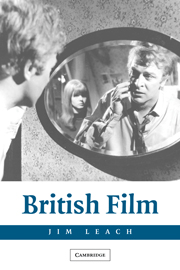Book contents
- Frontmatter
- Contents
- Acknowledgments
- Introduction
- 1 The National Health: Great Britain/Deep England
- 2 The Magic Box: What Is British Cinema?
- 3 The Common Touch: The Art of Being Realistic
- 4 The Mirror Crack'd: British Expressionism
- 5 Millions like Us: National Cinema as Popular Cinema
- 6 The Stars Look Down: Acting British
- 7 No Sex Please – We're British: Sex, Gender, and the National Character
- 8 Carry On Regardless: The British Sense of Humor
- 9 Sexy Beasts: British Monsters
- 10 The Ruling Class: Ideology and the School Movie
- 11 The Long Memory: History and Heritage
- 12 I'm British but … : Empire and After
- Notes
- Bibliography
- Filmography
- Index
8 - Carry On Regardless: The British Sense of Humor
Published online by Cambridge University Press: 07 May 2010
- Frontmatter
- Contents
- Acknowledgments
- Introduction
- 1 The National Health: Great Britain/Deep England
- 2 The Magic Box: What Is British Cinema?
- 3 The Common Touch: The Art of Being Realistic
- 4 The Mirror Crack'd: British Expressionism
- 5 Millions like Us: National Cinema as Popular Cinema
- 6 The Stars Look Down: Acting British
- 7 No Sex Please – We're British: Sex, Gender, and the National Character
- 8 Carry On Regardless: The British Sense of Humor
- 9 Sexy Beasts: British Monsters
- 10 The Ruling Class: Ideology and the School Movie
- 11 The Long Memory: History and Heritage
- 12 I'm British but … : Empire and After
- Notes
- Bibliography
- Filmography
- Index
Summary
In Pimpernel Smith (Leslie Howard, 1941), a German minister investigates the claim that the British “secret weapon” in World War II is their “sense of humor.” He reads excerpts from several British writers and then dismisses the idea as a myth. The film plays on the contrast between Teutonic pomposity and the intellectual agility that enables its hero (Howard), an apparently inoffensive English professor who is actually a master of irony and disguise, to outwit the Nazi security forces on their own soil. It effectively illustrates Jeffrey Richards's claim that “the war had brought into sharp focus the meaning of England and Englishness” around such ideas as “a love of tradition, of balance and order; a belief in tolerance and humanity; and above all, perhaps, a sense of humour, that redoubtable bulwark against tyranny.”
The idea that a nation can have a sense of humor is in itself quite funny, but it is a persistent factor in most accounts of British culture. As one writer on the national character put it, “the surest way to affront any Englishman is to suggest to him that he has no sense of humour.” Presumably the same could be said for the Scots, Welsh, and Irish, as well as women from all parts of the nation, but (as in many other cases) the British sense of humor often appears to be predominantly English.
Of course, not all Britons have a sense of humor, and there is probably no one who finds all British comedies funny.
- Type
- Chapter
- Information
- British Film , pp. 143 - 160Publisher: Cambridge University PressPrint publication year: 2004

